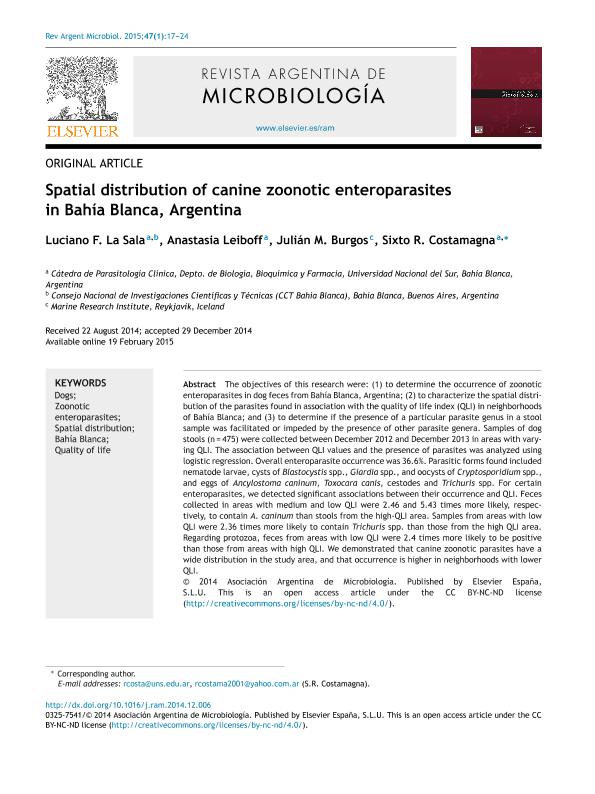Mostrar el registro sencillo del ítem
dc.contributor.author
la Sala, Luciano Francisco

dc.contributor.author
Leiboff, Anastasia
dc.contributor.author
Burgos, Julián
dc.contributor.author
Costamagna, Sixto R.
dc.date.available
2017-01-10T22:03:12Z
dc.date.issued
2015-02
dc.identifier.citation
la Sala, Luciano Francisco; Leiboff, Anastasia; Burgos, Julián; Costamagna, Sixto R.; Spatial distribution of canine zoonotic enteroparasites in Bahía Blanca, Argentina; Asociación Argentina de Microbiología; Revista Argentina de Microbiología; 47; 1; 2-2015; 33-41
dc.identifier.issn
0325-7541
dc.identifier.uri
http://hdl.handle.net/11336/11105
dc.description.abstract
The objectives of this research were: (1) to determine the occurrence of zoonotic enteroparasites in dog feces from Bahía Blanca, Argentina; (2) to characterize the spatial distribution of the parasites found in association with the quality of life index (QLI) in neighborhoods of Bahía Blanca; and (3) to determine if the presence of a particular parasite genus in a stool sample was facilitated or impeded by the presence of other parasite genera. Samples of dog stools (n = 475) were collected between December 2012 and December 2013 in areas with varying QLI. The association between QLI values and the presence of parasites was analyzed using logistic regression. Overall enteroparasite occurrence was 36.6%. Parasitic forms found included nematode larvae, cysts of Blastocystis spp., Giardia spp., and oocysts of Cryptosporidium spp., and eggs of Ancylostoma caninum, Toxocara canis, cestodes and Trichuris spp. For certain enteroparasites, we detected significant associations between their occurrence and QLI. Feces collected in areas with medium and low QLI were 2.46 and 5.43 times more likely, respectively, to contain A. caninum than stools from the high-QLI area. Samples from areas with low QLI were 2.36 times more likely to contain Trichuris spp. than those from the high QLI area. Regarding protozoa, feces from areas with low QLI were 2.4 times more likely to be positive than those from areas with high QLI. We demonstrated that canine zoonotic parasites have a wide distribution in the study area, and that occurrence is higher in neighborhoods with lower QLI.
dc.format
application/pdf
dc.language.iso
eng
dc.publisher
Asociación Argentina de Microbiología

dc.rights
info:eu-repo/semantics/openAccess
dc.rights.uri
https://creativecommons.org/licenses/by-nc-nd/2.5/ar/
dc.subject
Perros
dc.subject
Enteroparasitosis
dc.subject
Zoonosis
dc.subject
Epidemiologia
dc.subject
Bahía Blanca
dc.subject.classification
Epidemiología

dc.subject.classification
Ciencias de la Salud

dc.subject.classification
CIENCIAS MÉDICAS Y DE LA SALUD

dc.title
Spatial distribution of canine zoonotic enteroparasites in Bahía Blanca, Argentina
dc.type
info:eu-repo/semantics/article
dc.type
info:ar-repo/semantics/artículo
dc.type
info:eu-repo/semantics/publishedVersion
dc.date.updated
2016-12-07T18:13:46Z
dc.identifier.eissn
1851-7617
dc.journal.volume
47
dc.journal.number
1
dc.journal.pagination
33-41
dc.journal.pais
Argentina

dc.journal.ciudad
Buenos Aires
dc.description.fil
Fil: la Sala, Luciano Francisco. Universidad Nacional del Sur. Departamento de Biologia, Bioquimica y Farmacia. Catedra de Parasitologia Clinica; Argentina. Consejo Nacional de Investigaciones Científicas y Técnicas; Argentina
dc.description.fil
Fil: Leiboff, Anastasia. Universidad Nacional del Sur. Departamento de Biologia, Bioquimica y Farmacia. Catedra de Parasitologia Clinica; Argentina
dc.description.fil
Fil: Burgos, Julián. Marine Research Institute; Islandia
dc.description.fil
Fil: Costamagna, Sixto R.. Universidad Nacional del Sur. Departamento de Biologia, Bioquimica y Farmacia. Catedra de Parasitologia Clinica; Argentina
dc.journal.title
Revista Argentina de Microbiología

dc.relation.alternativeid
info:eu-repo/semantics/altIdentifier/url/http://www.redalyc.org/articulo.oa?id=213038579004
dc.relation.alternativeid
info:eu-repo/semantics/altIdentifier/doi/http://dx.doi.org/10.1016/j.ram.2014.12.006
dc.relation.alternativeid
info:eu-repo/semantics/altIdentifier/url/http://www.sciencedirect.com/science/article/pii/S0325754115000061
Archivos asociados
